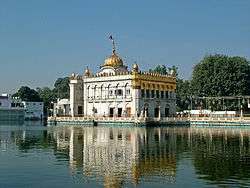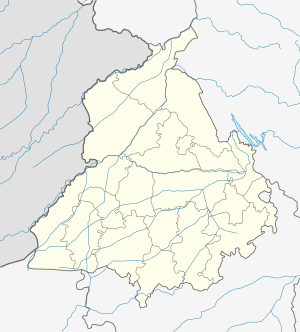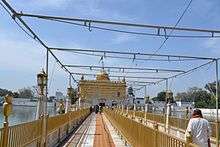Durgiana Temple
| Durgiana Temple ਦੁਰਗਿਆਨਾ ਮੰਦਿਰ | |
|---|---|
 Durgiana Temple, Amritsar. | |
 Location in Amritsar, Punjab | |
| Geography | |
| Coordinates | 31°38′N 74°52′E / 31.64°N 74.86°ECoordinates: 31°38′N 74°52′E / 31.64°N 74.86°E |
| Country | India |
| State | Punjab |
| District | Amritsar district |
| Location | Amritsar |
| Culture | |
| Sanctum | Durga |
| Major festivals | Dussehra, Janmashtami, and Rama Navami and Diwali |
| Architecture | |
| Number of temples | 1 |
| History | |
| Date built | Built in 1921 |
The Durgiana Temple(ਦੁਰਗਿਆਨਾ ਮੰਦਿਰ), also known as Lakshmi Narayan Temple, Durga Tirath and Sitla Mandir, is a premier temple situated in the city of Amritsar, Punjab, India.[1] Though a Hindu temple, its architecture is similar to the Golden Temple.[2] This temple derives its name from the Goddess Durga, the chief Goddess deified and worshipped here. Idols of Goddess Laksmi (goddess of wealth) and Vishnu (the protector of the world) are also deified here and worshipped.[3]
Location

The temple is situated near the Lohgarh gate, in Amritsar, in the Indian state of Punjab . It is very close to the Amritsar Railway station, and is about 1.5 kilometres (0.93 mi) from the bus station. Amritsar is well connected by road, rail and air services with the rest of the country.[1] Flights to Delhi operate from the Raja Sansi Airport, which is 12 kilometres (7.5 mi) to the north west of Amritsar. There are direct rail links to Delhi, Calcutta and Mumbai.[4] The National Highway No. 1 (India) connects Delhi to Amritsar.[5]
History
It was built in 1921 by Guru Harsai Mal Kapoor in the architectural style of the Sikh Golden Temple.[1][6] The newly built temple was inaugurated by Pandit Madan Mohan Malaviya.[1]
Even though Amritsar is not declared a Holy city, restrictions are in force prohibiting sale of tobacco, liquor and meat within a radius of 200 metres (660 ft) around this temple and the Golden Temple.[7]
Features
The temple is built in the middle of a sacred lake, which measures 160 metres (520 ft) x 130 metres (430 ft). Its dome and canopies are similar to that of the Golden temple of Sikh religion, also located in Amritsar. A bridge provides the approach to the temple.[6] The dome of the temple is gilded. Marble is used extensively in the temple's features.[8] The dome is illuminated with colourful lights. The temple is sometimes called Silver temple because of its large exquisitely designed silver doors.[1] It has a rich collection of Hindu scriptures.[8] The temple complex also has some historic subsidiary temples such as Sita Mata and Bara Hanuman.[1]
Festivals
Major Hindu festivals celebrated in the temple are Dussehra, Janmashtami, Rama Navami, and Diwali.[1]
Renovation
The temple and its precincts are under a beautification programme since 2013, which is planned to be completed by 2015. This will provide more space for worship both inside and outside the temple premises. As per the Master Plan prepared for reshaping the environment around the temple, 55 properties have been acquired with adequate compensation package and demolished for the purpose of development works. Under this plan a multi-storied parking complex, an open-air theatre, a shopping complex and other facilities are under construction.[9]
References
- 1 2 3 4 5 6 7 Discover Punajb. Parminder Singh Grover. pp. 28–29. GGKEY:LDGC4W6XWEX.
- ↑ "Durgiana Temple (Lakshmi Narain Temple)". National Informatics center.
- ↑ Gajrani 2004, p. 220.
- ↑ Travel House Guide to Incredible India. Travel House. 2004. pp. 48–. ISBN 978-81-241-1063-8.
- ↑ Allied Geography - Book 3 For Class Viii. Allied Publishers. pp. 139–. ISBN 978-81-7764-029-8.
- 1 2 Bansal 2005, p. 178.
- ↑ Aggarwal 1992, p. 111.
- 1 2 Punjab Travel Guide. Good Earth. pp. 58–. ISBN 978-93-80262-17-8.
- ↑ "Durgiana temple renovation work gains momentum". The Hindustan Times. 7 October 2014.
Bibliography
- Aggarwal, J. C. (1 January 1992). Modern History of Punjab: A Look Back Into Ancient Peaceful Punjab Focusing Confrontation and Failures Leading to Present Punjab Problem, and a Peep Ahead : Relevant Select Documents. Concept Publishing Company. ISBN 978-81-7022-431-0.
- Bansal, Sunita Pant (1 June 2005). Encyclopaedia of India. Smriti Books. ISBN 978-81-87967-71-2.
- Chaturvedi, B.K. Tourist Centers Of India. Diamond Pocket Books (P) Ltd. ISBN 978-81-7182-137-2.
- Gajrani, S. (2004). History, Religion and Culture of India. Gyan Publishing House. ISBN 978-81-8205-060-0.
External links
| Wikimedia Commons has media related to Durgiana Temple. |